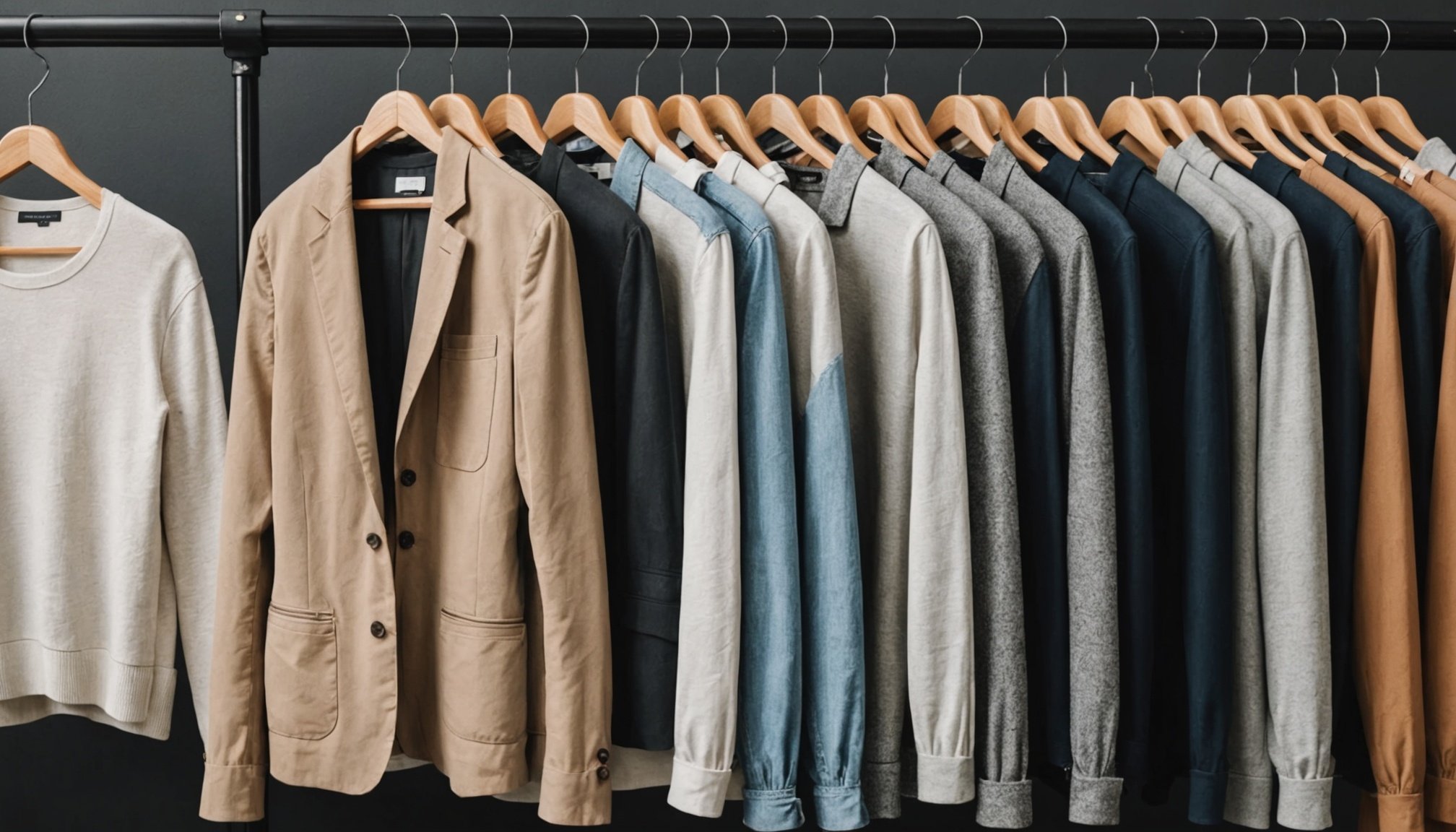Understanding a Capsule Wardrobe
A capsule wardrobe is a small, curated collection of clothing items designed to be versatile and timeless. The emphasis is on quality rather than quantity, integrating eco-friendly fashion into a minimalist lifestyle. This approach significantly simplifies daily dressing routines and reduces decision fatigue. The importance of a capsule wardrobe lies in its ability to encourage thoughtful purchasing decisions, promoting a sustainable way of living.
The key principles of creating a minimalist wardrobe include selecting pieces that are versatile, durable, and timeless. Focus on neutral colours and classic silhouettes to maximise compatibility among items. Regularly evaluating and refining your wardrobe ensures it meets personal style needs while aligning with minimalist ideals.
Also to see : Ultimate Guide to Choosing the Ideal Raincoat for the UK”s Ever-Changing Weather
Traditional fashion practices often leave a heavy environmental footprint. Fast fashion, characterised by rapid production and consumption cycles, contributes to pollution and waste. Shifting towards a capsule wardrobe addresses these environmental concerns, as it reduces the demand for excessive manufacturing and resource usage. The focus on quality over quantity in eco-friendly fashion choices minimises waste and supports more sustainable production methods. Adopting a capsule wardrobe fosters an appreciation for fewer, more meaningful possessions, promoting an environmentally conscious lifestyle.
Essential Eco-Friendly Clothing Items
Creating a sustainable wardrobe begins with essential clothing items that are eco-friendly and functional. A well-considered capsule wardrobe includes pieces that suit various occasions, ensuring you always have an appropriate option for any event. Start with a classic white T-shirt, a staple in any sustainable wardrobe essentials. Its versatility allows pairing with trousers, skirts, or even under a jacket for layered looks.
Also read : Mastering the Etiquette: Can You Wear White to a Wedding in the UK?
A tailored blazer in a neutral colour such as black or navy serves multiple purposes, whether in professional settings or casual outings. Its adaptability makes it a priority in reducing the number of clothes needed. Invest in a quality pair of denim jeans made from organic cotton or recycled materials. Their durability and style ensure long-lasting wear, emphasizing sustainability.
Multi-functional pieces, like a reversible jacket or dress that can seamlessly transition from day to night, save space and resources by minimizing the number of garments needed. Incorporating versatile colours and patterns, like stripes or gentle checks, increases mix-and-match opportunities, amplifying your wardrobe’s effectiveness. These essentials create a balanced wardrobe that aligns with eco-conscious values while promoting resourceful fashion choices.
Sustainable Fabric Choices
Choosing eco-friendly materials is a vital step towards a more responsible fashion industry. Sustainable fabrics, like organic cotton, Tencel, and recycled materials, offer not only environmental benefits but also longevity. Organic cotton is grown without harmful pesticides, maintaining soil fertility and decreasing water pollution. Tencel, derived from eucalyptus trees, boasts a closed-loop production process, reducing waste. Meanwhile, recycled materials, such as polyester from plastic bottles, help reduce landfill waste.
Understanding fabric durability is crucial when selecting sustainable options. Durable textiles provide longer-lasting products, decreasing the need for frequent replacements and thus lowering waste. By investing in high-quality materials, consumers support not only eco-friendly practices but also a more sustainable wardrobe.
Identifying sustainable brands can be challenging, but there are strategies to make informed decisions. Look for certifications, such as GOTS for organic textiles or OEKO-TEX for chemical safety. Researching a brand’s ethos, production processes, and transparency can also provide insights into their commitment to sustainability. By prioritising sustainable fabrics and engaging with ethical brands, individuals can contribute significantly to reducing the environmental impact of fashion while enjoying durable and stylish products.
Benefits of Minimalism in Fashion
Minimalism in fashion offers numerous advantages. By promoting sustainability, it encourages reduced consumption and waste. A simplified lifestyle helps fashion enthusiasts focus on essential garments rather than pursuing fleeting trends. This change leads to a decrease in garment production demands and, consequently, a reduction in resources used.
Moreover, a decluttered wardrobe provides significant psychological benefits. Owning fewer but more meaningful clothing pieces lowers decision fatigue and promotes a sense of contentment. It can lead to increased mindfulness regarding purchase decisions and clearer personal style. Individuals embracing minimalism often feel more organized and experience less stress, aligning their wardrobes with personal and environmental values.
Adopting minimalism allows consumers to align their lifestyle with sustainability goals. Opting for quality over quantity means investing in versatile items, encouraging thoughtful, long-term fashion choices. Reducing consumption not only minimises environmental impact but also supports ethical brands prioritising responsible manufacturing.
Minimalism’s benefits extend beyond aesthetics, impacting the mind and environment positively. Simplifying closets contributes to a balanced, sustainable lifestyle, simultaneously enhancing personal well-being. By focusing on what truly matters, both psychologically and environmentally, enthusiasts can merge fashion with authenticity and social responsibility.
Tips for Shopping Responsibly
Responsible shopping is about making mindful choices that have a positive impact on the environment and society. It starts with creating a shopping list to avoid impulse purchases. A detailed list helps you focus on essentials, reducing unnecessary buying and waste. Without it, shoppers are more likely to succumb to promotions or deals that weren’t initially intended to be part of their purchase.
Next, researching brands for ethical practices is vital. Ethical brands are committed to fair trade, sustainable sourcing, and transparent production processes. To verify claims, consumers can look for certifications such as Fair Trade, B Corp, or GOTS. These labels guarantee that brands adhere to strict environmental and social standards in their operations.
An often overlooked option in sustainable shopping is second-hand shopping and clothing swaps. These alternatives reduce waste and the demand for new resources. Second-hand shops offer quality items at a fraction of the cost, while clothing swaps allow you to refresh your wardrobe without purchasing new garments. Both methods are effective in supporting a circular economy and minimizing your environmental footprint. By incorporating these sustainable shopping tips, consumers can make a significant impact on both local and global communities.
Examples of Eco-Friendly UK Brands
In recent years, UK sustainable fashion brands have risen to the forefront of eco-conscious shopping. These eco-friendly retailers champion ethical practices, offering alternatives to fast fashion that appeal to environmentally aware consumers.
Among the most iconic is Stella McCartney, known for her commitment to cruelty-free and sustainable materials without compromising on style. The brand provides an excellent example of how high-end fashion can be ethically manufactured.
For more accessible alternatives, People Tree stands out, famously pioneering sustainable and fair trade fashion. Their commitment to ethical practices extends to working closely with artisans and using organic cotton. This approach is commendable and serves as a model for others in the industry.
Local initiatives, such as ethical marketplaces like Etsy UK, enable small-scale artisans to reach new audiences. These platforms not only celebrate artisanal craftsmanship but also bolster sustainable options by promoting a plethora of handmade, environmentally-friendly items.
Finally, Ethical Superstore offers a robust selection of sustainable goods ranging from clothing to household products. As more consumers seek ethical choices, such platforms become crucial in shaping a more sustainable future.
These examples underscore the pivotal role UK brands play in driving eco-friendly fashion and fostering a positive impact on the environment.











